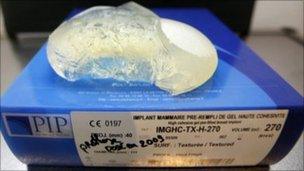Woman's 'constant pain' after PIP breast implants
- Published

Ms Smith said she had suffered constant pain and could not work after she had PIP implants
A Nottinghamshire woman says she has been seriously ill and undergone five operations after having low-grade silicon breast implants fitted.
Tara Smith, 40, from Newark, had the controversial Poly Implant Prothese (PIP) implants in 2006.
France banned the PIP implants, found to be made with industrial silicone, in 2010 and 30,000 women were advised to have them removed.
Ms Smith said UK women should have their PIP implants removed by the NHS.
The UK is set to reveal its updated advice to 40,000 affected women later.
"I had the implants done in 2006, then had to have them changed as they ruptured but have since had five operations, infections and illnesses due to the PIPs," said Ms Smith, who has spent £23,000 on trying to correct her surgery.
"I had the PIPs replaced with allergen implants last year but there is still silicon left in my body and it has been horrendous for my health, I am ill all the time."

The French government says the PIP implants have a greater chance of rupturing than others
Concerns about the safety of the firm's implants were raised when French surgeons noticed they ruptured more easily than others.
PIP had used low-grade industrial silicone gel, that had been manufactured for use in mattresses, in place of specialist medical materials.
When an implant ruptures, the silicone gel filling can leak into the body. Some women will not notice anything at all and there is no evidence of an increased cancer risk.
However, it can result in the formation of scar tissue which can change the shape and feel of the breast.
The gel can be an irritant, causing pain and inflammation. It can also be more difficult to remove an implant once it has ruptured.
"I think people need to know about this, as they just don't seem to get that we are walking around with mattress filler in their bodies," said Ms Smith.
"I have had constant pain, headaches and feel as if I am about 80, not 40."
"I think the government needs to force [private] clinics to take action because, they've got to, because they think they're getting away with it."
Since first becoming aware of the PIP problems, Ms Smith has started a Facebook group, external which has attracted membership from 700 women who have experienced problems or have concerns about the implants.
The French government has quoted a rupture rate of 5% and will fund operations for women to have their implants removed.
But UK ministers have previously said the risk is much lower - with authorities putting the rate in line with other implants at 1%.
However, they ordered a review after reports from one cosmetic surgery group, Transform, suggested it could be as high as 7%.
- Published6 January 2012
- Published6 January 2012
- Published4 January 2012
- Published10 December 2013
- Published3 January 2012